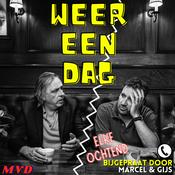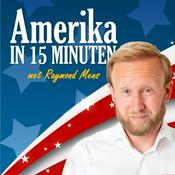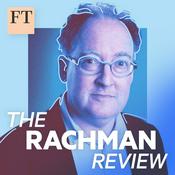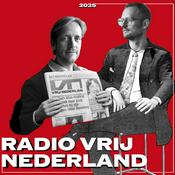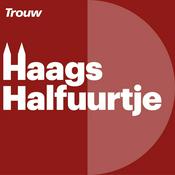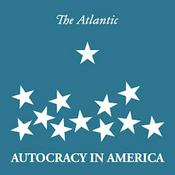48 afleveringen
- In the final CNE podcast of 2025, host Evert van Vlastuin brings together Jeff Fountain (Schuman Centre of European Studies, based in the Netherlands) and Kevin Swanson (pastor and podcast host from Denver, Colorado) for a frank cross‑Atlantic conversation. The big question: are America and Europe simply in decline, or is God quietly at work in ways the headlines miss?
Swanson arrived with strong language about Europe as the “post-Christian” continent, in a [podcast](https://www.sermonaudio.com/sermons/2212565333861) after the Munich Security Conference. The “worship of man” had replaced the “fear of God”, he said, and the pro-life movement in Europe had shrunk to only seven pro‑lifers in the Netherlands. In this CNE conversation, those claims are put to the test.
In the CNE podcast, Kevin Swanson cheerfully admits that he sometimes uses an “Eeyore’s viewpoint”, referring to the pessimistic friend of Winnie the Pooh, in combination with an “occasional hyperbole”.
Jeff speaks about the “paradox of Europe”. On one side, it is most shaped by the Gospel and its rejection. However, he also sees surprising signs of hope, from high-profile converts like Ayaan Hirsi Ali to growing migrant congregations in cities like Amsterdam and London, and a “quiet revival” among Gen Z.
Kevin, by contrast, looks at “despicably low” church attendance rates and the power of humanist education, and wonders whether Europe’s foundations are already rotten.
Jeff Fountain is the author of *Deeply Rooted*, in which he explains the basis of European integration from the Christian convictions of Robert Schuman, who pleaded for reconciliation between nations.
Kevin says that he disagrees with the “popular eschatology” among American Evangelicals that says that Europe is the “beast” from the Apocalypse. But he still sees that the Enlightenment is destroying the foundation of the culture and that humanist ideology is guiding the schools on the continent.
During the podcast recording, the conversation takes a surprising turn: Swanson admits America needs less bravado and more repentance. Kevin disagrees with the continuous attacks on Europe from Donald Trump. He says he is no fan of the American President. “He is an accident waiting to happen”, although he had praised his re-election in an earlier podcast.
At the end, Jeff and Kevin agree that America and Europe are “equally in trouble”, also looking at the abortion legislation. They both feel “betrayed” by the present administration in Washington. Kevin: “I am working for a MAHA: Make America Humble Again.” But so far, he has not sold more than eight hats, he says.
With CNE podcast host Evert van Vlastuin, Jeff and Kevin share concerns about the transatlantic cooperation within NATO and other bodies.
For more, visit https://CNE.news or subscribe to our newsletters at https://cne.news/subscribe - Organising a brothel was easier than having a Tupperware party, Frank Heinrich says. Before Germany introduced its new prostitution law, in 2017, regulations on brothels were shockingly loose. Even a Tupperware party was scrutinised more critically than the sex industry.
In the CNE podcast, he explains why more than 99 per cent of all stakeholders in this slavery system are men, why nobody knows precisely how many people are trafficked, and why he opposes a simple ban on prostitution.
Having worked with the Salvation Army, in the German Bundestag, and the Evangelical Alliance, Heinrich says this mission is closest to his heart. As his name is Frank, he loves freedom and “this became a life thing for me”, he tells.
The new prostitution legislation was introduced in 2017. That has already shed more light on the dark sector. But Frank believes further steps are needed. That includes the Nordic model, which penalises buyers rather than sellers of sex, whilst prostitution in itself could be decriminalised. When France introduced this system, the sex tourism in German border towns reportedly dropped within weeks.
Therefore, he advocates for this system to be introduced in Germany as well. “In ten years, I don’t want to live in a country that has not looked into this value”, he shares with CNE podcast host Evert van Vlastuin.
Germany is the “brothel of Europe”, the President of the German Parliament said recently. She echoes other authoritative sources.
To solve the problem, the help of other countries is necessary, Frank says. For this reason, he appreciates the several declarations of the European Parliament in favour of the Nordic model.
The organisation “Gemeinsam gegen Menschenhandel” is not specifically a Christian organisation. But many people who are involved in the battle against trafficking work from a Christian mindset, Frank says. “It is a reflection of my heart to be the spokesman for people who cannot speak for themselves. Trafficking is an affront to our values.”
For more, visit https://CNE.news or subscribe to our newsletters at https://cne.news/subscribe - Many pastors in Europe became aware that God was calling them to the ministry after reading or listening MacArthur. That says Paul Mitchell, the European director of Grace to You.
Grace to You (GTY) is the organisation that coordinated much of MacArthur’s activities in California, US. The renowned American pastor passed away this July at the age of 86. But he was never a celebrity, Paul says.
MacArthur served the Grace Community Church in Los Angeles for 56 years. This is a Reformed Baptist congregation that is known worldwide. At this church, MacArthur spent 42 years on a sermon series about the New Testament, during which he preached on each verse. When he arrived as a young pastor, he negotiated a guaranteed 30 hours per week for study.
What was the result of this? Shortly after his death this summer, Charlie Kirk stated that MacArthur was among the top ten theologians after the Reformation.
In the podcast, Mitchell states that John MacArthur visited Europe frequently after the fall of the Iron Curtain in 1990. He mainly visited former Eastern Bloc countries, such as Romania and Ukraine.
What did he do there? Supporting pastors. “The people that he loves the most outside his family and his church are pastors”, Paul Mitchell shares with CNE podcast host Evert van Vlastuin.
There are at least two organisations that grew out of MacArthur’s work, and those are The Master’s Academy International (TMAI), which has stations worldwide. The other is the European Bible Training Center (EBTC) in Germany and Switzerland.
At the moment, his extensive catalogue of teaching is now accessible in several languages –including Romanian and Spanish– thanks to re-preaching projects such as Grace Reaches Out.
MacArthur knew that he was famous, but he remained humble, Mitchel says. In the podcast, he shares whether MacArthur preferred to be announced as Doctor or as John. There is also an interesting detail about Dr Martyn Lloyd-Jones’ study desk.
Grace to You Europe has an office in Ashford in the English county of Kent, near London.
Listeners of the podcast will hear in several audio clips how MacArthur never bowed to the prevailing winds of culture. Whether challenging trends in Western Europe or critiquing stances on morality, his focus has consistently remained on the authority and sufficiency of Scripture.
For more, visit https://CNE.news or subscribe to our newsletters at https://cne.news/subscribe - Every day, Anja Tang and her colleagues search newspapers from all corners of Europe to look for incidents of intolerance against Christians. And sometimes, the breaches of religious freedom come even from the governments.
Anja Tang tells all about that in the CNE podcast.
At the office of OIDAC (Observatory on Intolerance and Discrimination against Christians), they search in all languages. But director (and CNE columnist) Anja Tang-Hoffmann knows that many incidents of hatred against Christians do not make it into the news.
When OIDAC presented its 2025 report in Brussels last week, one story caught everyone’s attention. A visitor reported that a church liturgy in Brussels was disrupted by a man shouting “Allahu Akbar.” “We have a few of these cases”, Anja says.
Most often, those disturbances come from France, Spain and England. These countries are at the top in the annual report, together with Germany. In the podcast, she shares examples of vandalism. It even happens that churches are set on fire.
To CNE’s podcast host Evert van Vlastuin, Anja Tang shares that she finds it “surprising” that many times the intolerance comes from the governments themselves in the form of restrictions. In contrast, governments are expected to protect religious freedom.
Concrete examples are the buffer zones around abortion clinics. In a radius of 150 or 200 metres, you are not allowed to give any sign of disapproval to abortion. “Adam Smith Connor was punished for just having his head slightly bowed while he was silently praying. He did not speak a word and did not interact with anyone. But even that was a violation of this buffer zone rule.”
Tang is convinced that this is a breach of religious freedom on the part of the government. She rejects the “narrative” that people remain free to pray outside this zone. “Religious freedom has a public dimension. Individuals are free to pray wherever they want. The burden is on the government that restrictions are as narrow as possible, and that restrictions are only allowed if they are necessary to protect public order.” In the podcast, she clarifies that in most cases, there is no harassment of public order.
Behind all this, there is a “post-Christian ethics”, as Tang calls it. “Christianity emphasises the role of the individual and individual freedom and dignity. But the post-Christian ethics only looks at self-determination without any ties to human nature.”
Tang’s conclusion as OIDAC director is that the European Commission needs to appoint a coordinator for combating anti-Christian hate crime. Such an office already exists for Jews and Muslims. In the podcast, she explains why such a person is needed for Christians as well.
Hear Anja Tang explain why she believes Europe needs to act –and how faith freedom affects everyone– in this week’s CNE podcast.
For more, visit https://CNE.news or subscribe to our newsletters at https://cne.news/subscribe - That is the concern from the Norwegian lawyer Anders Ryssdal. He represents the Jehovah’s Witnesses in a court case regarding state grants for this religious group and certain Christian schools.
In the talk with CNE’s podcast host Evert van Vlastuin, Anders Ryssdal explains the tensions between faith, state and society in one of Europe’s most secular countries. Anders has dealt with more cases regarding religious freedom, and he thinks there is an “indirect threat” to this liberty. A very secular state and society can give you a “stigma”, he says.
This stigma is there already for Jews, Ryssdal says. “They need police protection for the synagogue. There could be a personal risk to be a Jew.” This direct risk is not there for Christians. “If the government refuses funds to particular Christian societies, these societies are undermined and could suffer”, the lawyer says. This could be a path to marginalisation.
Ryssdal stresses that religious freedom is not only a liberty to believe, but also a liberty to assemble with others.
In this week’s CNE podcast, Ryssdal explains the Norwegian system of state money for all (recognised) religious groups. But the Jehovah’s Witnesses lost all grants because of their exclusion policy if members live a sinful life. This is especially sensitive if it concerns young members between 15 and 18 years, who are still minors legally.
Although Ryssdal won the first round, the case will reach Norway’s Supreme Court in February 2026 — and could redefine religious freedom in the country.
The conversation doesn’t end with Jehovah’s Witnesses. Christian schools in Norway tied to the conservative church community Menigheten Samfundet face scrutiny from the Ministry of Education. Their “crime”? Not teaching about homosexuality according to state expectations.
Ryssdal sees government interference as overreach: “It’s possible to teach both science and religious belief. The question is, are we allowed to stress the religious dimension?”
State money was originally only there for the state church. However, since the Church of Norway is no longer an official state church, the free churches also receive government funding to create legal equality. This means that pastors in independent churches and among Jehovah’s Witnesses also receive funding from Oslo.
Ryssdal admits that the government money makes the issue of religious freedom more complicated. “As soon as you get money from the state, the state gets a grip on you,” Ryssdal observes.
For more, visit https://CNE.news or subscribe to our newsletters at https://cne.news/subscribe
Meer Nieuws podcasts
Trending Nieuws -podcasts
Over CNE's Newsround Europe
News program from Christian Network Europe (CNE.news). Weekly update of the latest news on the European continent for & about Christians.
Podcast websiteLuister naar CNE's Newsround Europe, Weer een dag en vele andere podcasts van over de hele wereld met de radio.net-app

Ontvang de gratis radio.net app
- Zenders en podcasts om te bookmarken
- Streamen via Wi-Fi of Bluetooth
- Ondersteunt Carplay & Android Auto
- Veel andere app-functies
Ontvang de gratis radio.net app
- Zenders en podcasts om te bookmarken
- Streamen via Wi-Fi of Bluetooth
- Ondersteunt Carplay & Android Auto
- Veel andere app-functies


CNE's Newsround Europe
Scan de code,
download de app,
luisteren.
download de app,
luisteren.


